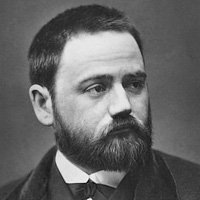The Experimental Novel by Émile Zola: An Overview
The essay begins with the two terms 'observation' and 'experiment' in which the former is related to sense perception whereas later is proved to be true or good. Observation indicates while experiment teaches. Experimentalist, being a true observer, compares and judges until the experimental hypothesis is verified or is valid.

Émile Zola (1840-1902)
According to Zola, experiment is possible in literature too. He argues that experimental novelist is neither a mere copyist of nature, nor a photographer. The very idea of experimentation implies that the novelist does more than merely reproduce facts. Zola says:
“The idea of experiment carries with it the idea of modification. We start, indeed from the true facts, which are our indestructible basis; but to show the mechanism of these facts, it is necessary for us to produce and direct the phenomena; this is our share of invention, here is the genius in the book” (647).
Zola asserts the facts that the novelist is both an observer and an experimentalist. Like the observer, he/she gives the facts as he/she sees them. The experimentalist voyages into the unknown to make it know while the idealist novelists deliberately remain in the unknown under the pretense that the unknown is nobler and more beautiful than the known. Here, Zola discusses the application and need of experimental novels. He is against the idealistic writing that focuses on supernatural or other. According to Zola the science of past has no current scientific value and so is the case in literature that past literature has no value today unless it is experimented. Thus, Zola hold that the artist and the scientist are the identical and says that the artist must know the discoveries of science so that he/she is at comfortable position to adopt them and build his/her own experimental novel on the solid basis of proven hypotheses. The only area where the writer may risk hypothesis is in the area where the facts are not yet settled. The text claims:
“The experimental novelist is therefore the one who accepts proven facts, who points out in man and in society the mechanism of the phenomena over which science is mistress, and who does not interpose his personals sentiments, except in the phenomena whose determinism is not yet settled, and who tries to test, as much as he can, this personal sentiments, this idea a priori, by observation and experiment.” (655)
Zola is convinced that the experimental method with triumph everywhere, not only in the novel but in history, criticism, drama, and even poetry, since literature depends not only upon the author but upon nature. Zola cannot completely accept this: he suggests that ancient poems survive because of their beauty, but the sort of virtue is really quaint and archaic. Physiological man has replaced metaphysical man.
“The metaphysical man is dead; our whole territory is transformed by the advent of the physiological man. No doubt “Achilles’ Anger,.” And “Dido’s Love,” will last forever on account of their beauty; but today we feel the necessity of analyzing anger and love, of discovering how such passions work in the human being… In short everything is summed up in this great face; the experimental method in letters, as in the phenomena, both individual and social, of which metaphysics, until how, has given only irrational and supernatural explanation.” (655)
Experimental novel deals with the highest manifestations of man as an individual and a social member. Experimental novelists are the analyzers of man in the individual and social relations. The novelist can use his ‘genius’ but under control of experiment. The experimental novelist is the one who accepts proven facts and who does not interpose his personal sentiments, except in the phenomena whose determinism is not settled yet.
Zola is the greatest exponent of Naturalism. The naturalistic novelist conceives himself as a scientific sociologist and psychologist, i.e. an experimentalist working with his hypothesis like scientist in a laboratory. For Zola, Naturalism is scientific realism, a kind of realism which accepts and uses the scientific methods based upon the proposition that man’s free will is an illusion and his acts are determined by his heredity and environment. This emphasis on determinism distinguishes Zola’s naturalism from other forms of realism.
Zola comes up with the thesis that literature should be governed by the same scientific method that governs the natural sciences:
“I am going to try and prove for my part that if the experimental method leads to the knowledge of physical life, it should also lead to the knowledge of the passionate and intellectual life. It is but a question of degree in the same path which runs from chemistry to physiology, then from physiology to anthropology and to sociology. The experimental novel is the goal.” (645)
Experimental novelist differs from Idealist and fatalist. Idealist does not experiment rather produces art based on supernatural and unknown world. Fatalism, on the other hand, believes in fate. It is a belief that man does nothing, by himself, it is fate that brings about change in his life. But determinism believes that certain conditions and factors govern the human nature and behavior. Fatalist discards cause and takes anything for granted.
Therefore, experimental novel regards all human activities as the outcome of heredity and outward circumstances. Like a scientist, an experimental novelist performs certain procedures such as observation, hypothesis, and verification with experiment and conclusion. Those novelists who undergo all these procedures and factors are considered to be a true experimental novelist, according to Zola.
